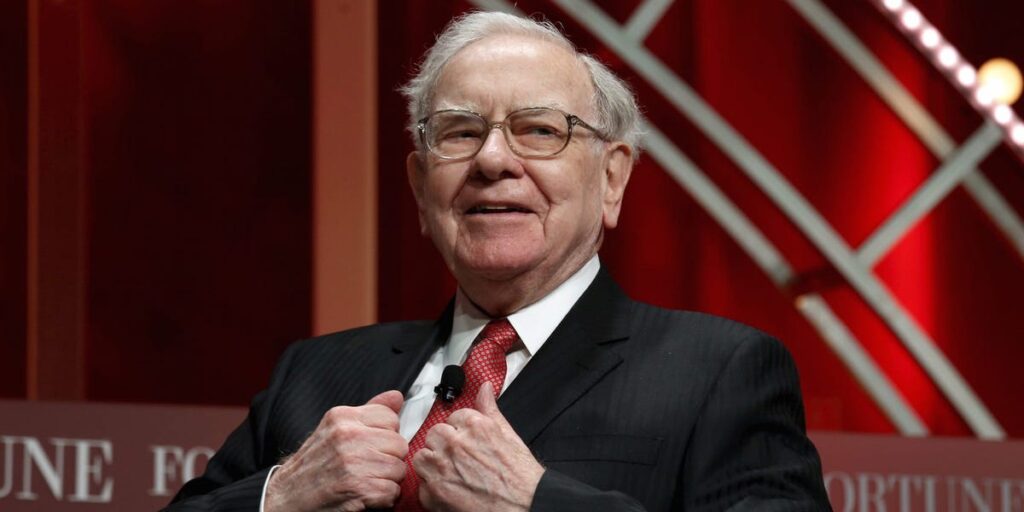Warren Buffett famously says to “be greedy when others are fearful” and “when it rains gold, put out the bucket, not the thimble.” The legendary bargain hunter has been waiting years for the stock market to crash like it did this week — but he might not be buying yet.
President Donald Trump’s unveiling of near-universal tariffs and foreign countries’ threats of retaliation vaporized upward of $5 trillion — more than double Nvidia’s market value — from the S&P 500 over the course of Thursday and Friday.
Some of Buffett’s favorite stocks got spanked, with Apple, American Express, Bank of America, and Occidental Petroleum all sinking more than 15% in two days.
Buffett’s longtime secretary, Debbie Bosanek, told BI in a statement: “Mr. Buffett is not doing interviews but instead is saving his commentary for the Q&A session on May 3 which is held before the Berkshire Annual Meeting.”
The downturn is likely to hearten the Berkshire Hathaway CEO, given he’s a value investor who looks to buy businesses at a discount to their worth. He’s also known to capitalize on crises, for example when he deployed $26 billion across five deals between 2008 and 2009.
Buffett wrote in his 2017 shareholder letter that sharp sell-offs can create “extraordinary opportunities” for investors who heed the writer Rudyard Kipling’s words to “keep your head when all about you are losing theirs.”
However, surging valuations have priced him out of buying stocks, acquiring businesses, and even repurchasing his own company’s stock in recent years.
Buffett, 94, has also off-loaded a net $158 billion of stocks over the past two calendar years. Berkshire’s cash pile has roughly tripled from under $110 billion in September 2022 to $321 billion at the end of 2024 — that’s bigger than Coca-Cola’s market value.
Armed with an overflowing war chest, Buffett appears well-placed to wade into the market rout and scoop up stocks on the cheap. The internet certainly agrees — social media is rife with comments and memes about Buffett sitting pretty while markets are in chaos.
Wall Street has also rewarded Buffett’s cash hoarding: Berkshire’s stock price is up about 9% this year, trouncing the S&P’s near 14% decline.
As of Thursday’s close, the share surge had added $23 billion to Buffett’s personal fortune and vaulted him past the likes of LVMH’s Bernard Arnault and Oracle’s Larry Ellison into fourth place on the Bloomberg Billionaires Index.
Yet the famously patient and disciplined investor might wait longer before embarking on a shopping spree.
“When prices fall, it certainly encourages Buffett to buy unless he views new permanent damage greater than the price discount,” Steven Check told Business Insider. Check oversees $2 billion in assets as the CEO of Check Capital Management and has attended every in-person Berkshire annual meeting since 1996.
Stocks may be cheaper than before, but Check said Buffett will likely “require a much larger drop to do significant buying.”
Waiting game
Buffett’s followers will likely have to wait until Berkshire’s meeting in May or its second-quarter portfolio update in August to learn whether the investor topped up his holdings this week.
Steve Hanke, a professor of applied economics at Johns Hopkins University who’s been teaching Buffett-style valuation to students for decades, told BI he’s “watching his next move with the most careful and anxious attention” as it will “tell us a great deal about where he thinks the economy is going.”
“If he plunges into the market and starts buying, it will signal that he believes the Trump tariffs were nothing more than a minor economic annoyance that created wonderful buying opportunities,” said Hanke, who is a former economic advisor to President Ronald Reagan and was the president of Toronto Trust Argentina when it was the world’s best-performing mutual fund in 1995.
If Buffett holds off, Hanke said it would suggest he’s keeping in mind the Smoot-Hawley tariffs of March 1930, which “broke the back of the stock market and helped to plunge the world into the Great Depression.”
Hanke’s “tentative guess” is that Buffett’s knowledge of economic history will lead him to “remain on the sidelines, at least for a while” until the scope of the economic situation becomes clearer.
If the frantic sell-off in markets continues, Buffett’s moment might come sooner rather than later.



